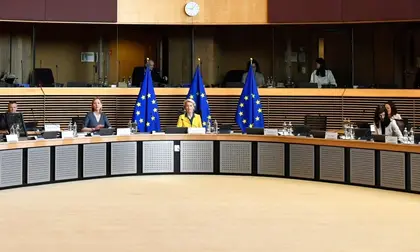An EU summit due to take place this week will decide whether Ukraine and Moldova become official candidates for EU membership. The EU Commission recommended granting the two countries candidate status but postponed Georgia’s membership application.
Although the accession process is likely to take years and present major hurdles, preferential treatment for these two ex-Soviet republics is a controversial topic in the European media.
JOIN US ON TELEGRAM
Follow our coverage of the war on the @Kyivpost_official.
Today, Europe’s press debates the contentious issue of whether Ukraine should be granted EU membership. Here are some opinions from a selection of European publications presented by eurotopics.
No departure from fundamental EU principles
Even if Ukraine and Moldova are granted EU candidate status core issues must be taken into account, warns Hungarian newspaper Népszava:
“Regardless of the current extraordinary procedure, the new candidates must also fulfil all admission criteria. This includes the obligatory clarification of border disputes, since large areas of both Ukraine and the Republic of Moldova are occupied by Russian troops. … As the examples of Hungary and Poland show, there is also the danger that enlargement could further erode fundamental European principles such as the rule of law and democracy. Since the new candidates are states that have no democratic tradition, the EU must proceed with caution to ensure it doesn’t disintegrate.”
The process could also be quick
It is quite possible that Ukraine will be able to meet the requirements for becoming a new EU member within a short time, German business paper Handelsblatt points out:
“Just as the Ukrainians are now fighting against an external enemy, they will also have to fight against internal threats to protect their future. They must disempower the oligarchs, whose wealth still gives them far too much influence over the state. They must prevent corruption and strengthen the rule of law. Something like this can take many years, and there can be setbacks. But it can also be done quickly if the people are determined and motivated. And this can hardly be denied in the case of the Ukrainians. The EU should set aside its doubts and grant Ukraine candidate status rather than slowing it down.”
Rejecting Georgia is dangerous
Polish web portal Onet criticises the EU Commission for not recommending candidate status for Georgia:
“The fact that Georgia has not been granted EU candidate status is a historic mistake. If Russia’s war in Ukraine is not sufficient proof that Putin only understands the power of political facts, what is? If the European Council doesn’t grant Georgia candidate status, the decision will be interpreted in the Kremlin as: ‘the door is open in the Caucasus and we have a free hand’. That could lead to an escalation of the war, this time in the Caucasus. Is it in the West’s interest to gradually hand over control of the Black Sea basin to Putin step by step?”
On the fast track
Danish daily Berlingske lists reservations about Ukraine joining the EU:
“The war will prevent normal development and reforms for many years. There are countries like Denmark that fear that the war will give Ukraine an undeservedly quick EU accession. Some fear that reason will give way to emotionalism, and that in six months Ukraine will be put on the fast track based on sympathy, with all the consequences this would entail. Ukraine will be one of the largest countries to be integrated into the EU.”
A “no” would be heartless and ungrateful
Belgian daily De Standaard sees far more arguments in favour of Ukraine being given EU candidate status already:
“Slamming Europe’s door in their faces would almost be an act of heartless ingratitude which the Ukrainians would never forgive us for. But the one who would be delighted to see Ukraine receive another injury and Europe divided by a dispute is Vladimir Putin. … Moscow can only dream of a situation in which President Zelensky, the Ukrainian civilian resistance and the Ukrainian army have to deal with an unexpected moral setback. Europe can really only take this historic decision with a generous heart and welcome Ukraine into the family.”
Symbolism matters
The issue right now is candidate status, not membership, The Economist reminds its readers:
“The fainthearted will object, saying that Ukraine is too poor, too corrupt and now too war-torn to join the cosy club. That is true, but it misses the point. No one imagines that Ukraine will be ready to become a member for many years yet. It will have plenty of hoops to jump through before that can or should happen. If Ukraine does not make sufficient progress, it should not be admitted. The progression from candidate to member is by no means inexorable: Turkey has been in the queue since 1987. … The symbolism of such a statement is huge.”
Many skeptical about fast-track accession
The EU will face a new test, Italian daily La Stampa predicts:
“On the one hand, there are the supporters of rapid accession – first and foremost Poland and the Baltic republics – and on the other, those who believe that the accession phases should be the same for everyone, without exception. France has said this clearly, and Clément Beaune, the recently appointed Minister for European Affairs, reiterated it yesterday. Others, when asked, have also said this – the Netherlands and Denmark, for example. Yesterday, Germany also officially sided with France. Macron is trying to reassure his Western allies but at the same time not let the thin thread of dialogue with Putin break.”
You can also highlight the text and press Ctrl + Enter



